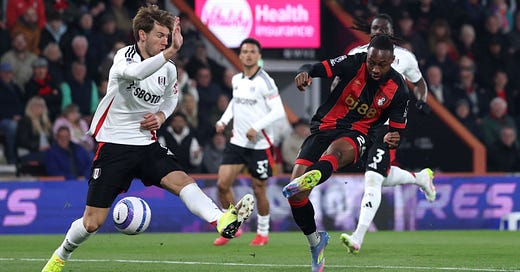Premier League’s Betting Problem: The Unlicensed Gamble at the Heart of English Football
With clubs still cashing in on betting sponsors, despite government warnings and surrendered licenses, the Premier League faces a reckoning with the industry it relies on.
For decades, betting has hovered around English football like floodlights over a winter pitch, always on, always present. But the glow is starting to flicker. In May 2025, a fresh warning from the UK Gambling Commission put four Premier League clubs, Bournemouth, Fulham, Newcastle United, and Wolves, under scrutiny.
The reason? Their sponsorship ties to betting websites operated by TGP Europe, a firm that has now surrendered its British gambling license.
This isn't just a contractual hiccup. It’s a potential legal landmine.
The Commission didn’t mince words. Clubs were explicitly told they “may be liable to prosecution… if they promote unlicensed gambling businesses that transact with consumers in Great Britain.”
And yet, if you tuned into a match recently, you probably still saw some of those brands, bj88, Sbotop, Debet, 96.com, plastered across shirt fronts and LED hoardings. The disconnect is jarring: the sport that champions community, youth development, and fan connection is also risking everything to keep the cash flowing from betting companies under investigation.
To understand how we got here, we need to follow the money.
According to GlobalData’s 2024–25 Premier League business report, gambling companies are responsible for 55% of all front-of-shirt sponsorships this season. That translates to about $135 million, making betting the single largest industry presence on the chests of top-tier English clubs. This is despite the 2023 decision by Premier League clubs to voluntarily phase out such sponsorships by the 2026–27 season.
That three-year grace period was framed as a compromise, clubs could honour existing contracts, avoid sudden revenue losses, and slowly shift toward more ‘socially responsible’ partnerships. But the current controversy shows just how risky even that temporary tolerance has become.
TGP Europe’s surrender of its UK license came after a damning investigation that cited breaches in anti-money laundering rules and insufficient partner vetting. The £3.3 million penalty they were ordered to pay wasn’t just a fine, it was a final warning. They walked away from the UK market instead.
Yet their brands remain deeply embedded in English football.
Follow me for more sports and life updates: Instagram
It’s tempting to blame the clubs. After all, they're the ones signing these sponsorship deals. But it’s more complicated than that.
Many of the brands tied to TGP Europe operate via so-called “white label” arrangements, outsourcing operations through intermediaries who technically hold the license while letting the real brands operate in the background, often targeting overseas markets. Newcastle United’s long-term deal with Fun88 is a classic case: when it ceased as the club’s shirt sponsor, it quietly pivoted to being the “official Asian betting partner.”
These partnerships often skirt the edges of legality. The branding is pitched as targeting international viewers, but the reality is, if the site is accessible from the UK and is unlicensed, it violates UK law.
The clubs claim plausible deniability. But as the Gambling Commission has now made clear, that won’t be enough to protect them anymore.
This issue isn’t just legal or financial. It’s cultural. What message does it send when clubs with strong community roots, some of which run gambling addiction programmes in their foundations, are fronting for firms facing legal scrutiny?
Football’s relationship with gambling has always been a dance of convenience. For years, betting revenue helped sustain clubs lower down the pyramid and pumped millions into Premier League marketing. Fans grew used to the flashing odds and in-play offers. But tolerance is waning. In a post-lockdown Britain, where gambling harm is finally being treated with the seriousness it deserves, the sight of clubs promoting unlicensed firms feels tone-deaf at best, exploitative at worst.
This cultural tension is why the 2026 ban exists in the first place. But for some clubs, especially those recently promoted or without Champions League money, the lure of an easy payday from a betting sponsor still outweighs the reputational risks.
The big question now is: will anything actually change?
The Gambling Commission says it’s conducting ongoing “spot checks” to ensure these sites remain blocked in the UK. But enforcement is notoriously difficult, especially when dealing with global platforms and VPN-savvy users. Meanwhile, as long as the clubs aren’t hit with fines or bans, the commercial incentives remain in place.
There’s also the question of whether the government’s Department for Culture, Media and Sport will push for tougher legislation. So far, they’ve allowed the Premier League to self-regulate. But if clubs continue promoting brands tied to unlicensed operators, that goodwill may evaporate quickly.
And let’s not forget the fans. Many have already grown cynical of their clubs’ priorities, seeing their teams more as commercial vessels than community institutions. A continued reliance on questionable gambling deals risks deepening that disconnect.
The 2026 ban on front-of-shirt gambling sponsorships should, in theory, reset the balance. But without clarity on enforcement, and with loopholes like sleeve sponsorships, pitch-side ads, and digital placements still available, the betting industry’s grip on football won’t disappear overnight.
The Premier League finds itself at a crossroads. It can either double down on self-interest and ride out the backlash, or it can take the harder path of real reform, starting with cutting ties to sponsors that no longer meet the standard for responsible partnership.
This isn't about moral panic. It's about legality, fan trust, and the long-term credibility of the world’s most-watched league.
It’s one thing to wear the badge. It’s another to wear the burden.
Thanks for reading, David Skilling.
Follow me on LinkedIn | X | Instagram
If you hit the like button, you’ll be doing me a huge favour, and if your business needs sports writing, wants to discuss advertising, or you have PR stories to pitch, feel free to get in contact.
If you know someone who will enjoy this article, please share it with them.




